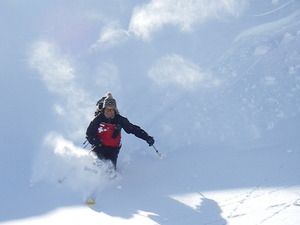Appendix S: Patrol Recruiting
From TBSPedia
Revision as of 14:24, 11 January 2009 by GregMarsden (Talk | contribs)
Tahoe Backcountry Ski Patrol Manual
What is a SkiAlong?
SkiAlongs are the best way to get to know the Tahoe Backcountry Ski Patrol. TBSP invites members of the public who may be interested in becoming candidates to join the patrol for "Ski-Along" days (held during regular Castle Peak patrol days) or the Introduction to Ski Patrol Day (held on the last patrol day, in mid-April).Ski Along requests are subject to the discretion of the Mountain Manager. We are able to provide Ski Alongs to prospective patrol candidates on most days when we patrol, but request at least 5 days notice for prospective ski along candidates.
How to arrange for a Ski Along
Contact recruiter@tbsp.org at least 5 days in advance to schedule your ski-along!
Ski-Along Procedure
- Guests are required to sign a liability waiver prior to patrolling with TBSP NSP Event Release Form from the NSP Document Library. Blank copies are also found in the Ops trailer black box.
- The guest must supply address and phone number(s) to the Mountain Manager by the Thursday prior to the ski-along day. The Mountain Manager (or as an alternate, the Operations Officer or Patrol Director) must send an email alert by Friday morning at the latest, with the contact info to the TNFS contact (currently Hank Hennessy at hhennessy@fs.fed.us). On the email copy recruiter@tbsp.org and operations@tbsp.org.
- No more than two guests may visit with TBSP on any Ski-Along day, except for the Introduction to Ski Patrol Day.
- Guests will patrol at Castle Peak, and only with a regular patrol team (not training, instruction, or “Challenging Terrain”).
- A guest may not bring or invite any other person (or dog) on patrol with TBSP, the only exception being for avalanche rescue dogs which are owned and have been trained by the guest.
- On the assigned patrol day, a guest shall meet TBSP at its Equipment Shed at 8:30 AM.
- A guest shall be expected to ski the same distance, duration, and terrain as the TBSP team, which may on occasion exceed six miles, 2000 feet of climbing, and 2000 feet of descent, with up to black-diamond difficulty, and any snow conditions, for a full day. It is the responsibility of the guest to be familiar with, and prepared for, such an effort.
- A guest will be accompanied by a radio-carrying TBSP patroller (to be assigned by the Team Leader) at all times while on patrol.
- Guests are not allowed to provide medical assistance, regardless of guest experience. TBSP patrollers shall take leadership of all incidents.
- Time (typically 30 – 60 minutes) will be provided as a lunch break.
- Return to the equipment shed typically occurs by shortly after sunset, but this is not guaranteed.
Please review the equipment list on the TBSP Introduction page. Guests should bring the following:
- Normal backcountry skiing clothes or functional equivalent, with the following recommendations:
- Armpit zips for comfort and excess heat removal
- Pants permitting maximum range of leg motion
- Sufficient number of layers to permit comfort in all environmental conditions
- Pack sufficient to carry all the above (2500 cubic inches recommended)
- Metal-edge skis with either a sturdy freeheel binding, randonee binding, or alpine binding and freeheel adapter (e.g. “alpine trekker”); NNN-BC bindings and/or fishscale skis are strongly discouraged
- Snowboarders must bring snowshoes, short x/c skis, or “Split-Decision” type snowboards in conjunction with ski poles for moving while on flats or uphills. No walking or postholing in snowboard boots alone is allowed.
- Skins
- Sturdy boots appropriate for the bindings and skis or snowboard
- Poles, preferably adjustable-length, ideally convertible to a probe; required for both skiers and snowboarders
- Avalanche probe (if guest’s poles are not convertible to a probe; will be provided by TBSP if necessary)
- 457 kHz avalanche transceiver with new batteries (transciever will be provided by TBSP if necessary)
- Shovel (will be provided by TBSP if necessary)
- Lunch and 1 liter of water
- Headlamp and spare batteries
- Whistle
- Toilet paper
- Plastic bags for human waste
Recommended, but not required, equipment is as follows:
- Knife
- Matches in waterproof container
- Norden 7.5’ map
- Compass, and skill in usage
- Length of parachute cord
